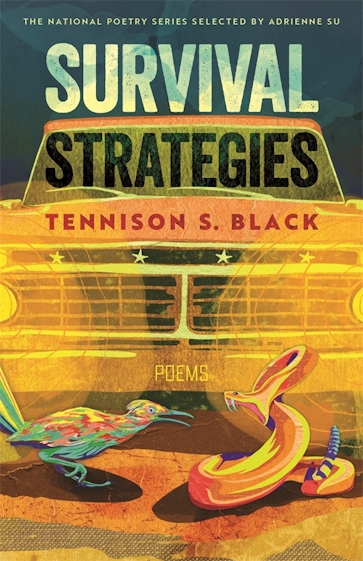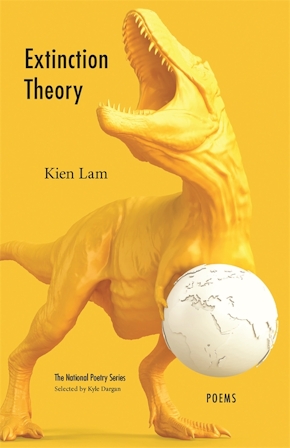Survival Strategies is a love story wrapped in a reckoning. Arranged in three parts, this collection of poems follows a narrative arc.The speaker, who is returning to the Sonoran of her birth after many years away, takes us with her on a journey of enlightenment.
In the course of the first section, "The Sunniest Place on Earth," we learn that the speaker has developed a deep hatred of the desert (a reflection of herself) due to the way she was treated and what she witnessed while being raised there. As we move through to part 2, "Estivate So You Don't Die," we see the speaker grappling with her past as a sensitive person amid the rugged realities of life in the Southwest. As this section closes, there is a long-form prose poem assembled as a mythopoetic fable titled, "The Mother and the Mountain," that explores her mother's childhood. This section brings revelation to some of what precedes it and reveals the speaker as the buttress of this family who, though an outsider, walks a path first laid by her mother. The final section is titled simply, "After," and as its title suggests, is a short set of poems that wrap up the arc and bring peace to our speaker as she comes to realize she never hated the desert, nor herself, as she is set free by the ocean of the Pacific Northwest.
The Sonoran desert, invoked through saguaros, scorpions, jackrabbits, coyotes, and cowboys, is nearly a character in these fierce poems, which chronicle the poet's return to a place that ‘has been trying to kill me since I was born.’ Recurring images of place, along with a unifying narrative, give
Survival Strategies the texture of a repeating form on a large scale, as the boundaries between the landscape and one family living in it begin to dissolve. This oneness reaches its crescendo in an original fable, ‘The Mother and the Mountain,’ which begins: ‘My mother was a bajada. That is, an alluvial fan that settled at the base of a mountain.’ Alive with hard-earned understanding and affirmation, these poems are for everyone who ever tried to leave a formative place of pain but found that person and place could never be fully untwined.
—Adrienne Su, author of Peach State
Tennison Black’s mesmerizing debut collection,
Survival Strategies, is a searching exploration of the poet’s deep roots in southern Arizona’s 'cowboy culture,' which she witnessed from the inside as a child. Having rejected her origins in that 'scratchy way of living' that was her father’s working ranch in Yuma, Black returns to confront and exorcise the violence that traumatized her. With grace and grit, Black creates a stunning portrait of the ethos of a male dominance (of nature, animals, and women) that haunts us all today. The prose fable that concludes this brilliant collection has the largesse of a vision. This book augurs a major new poet!
—Cynthia Hogue, author of instead, it is dark
In
Survival Strategies, we register some familiar tropes: women as rivers, men as mountains, a landscape readily metaphorized to explain conflict between the sexes. Here, a child studies the (of course) conscienceless Sonoran desert as if it could reveal the mysteries of her abusive, often absent, cowboy father or explain her mother—'a tempest, an alluvial slope'—who, eventually, fled the desert and the man. Familiar, yes, since these dynamics and the pain of being endangered by them have recurred and recurred, despite the first-, third-, how-many? waves. Tennison Black brings that landscape to life around a speaker who, in childhood, 'brinked between girl and indignant,' who couldn’t form a self without rebuke from the man or resignation from the woman, whose definitions of both self and love were wrought in deprivation and violence. And yet: Love floods this book, whose dare is to look trauma in its venomous eye—and choose 'am-ing, be-ing, staying put.'
—Sally Ball, author of Hold Sway
I've not been to the Southwest in over a decade, but Tennison Black's
Survival Strategies teleports me into the beauty and brutality of that region and its history with impeccable ease. Here we find the ‘glory of the jackrabbit, ‘the scorpion disguised as a boy,’ but also ‘the velvet muzzle.’ It is landscape at war with itself that Black sketches with impressive personal detail. This is easily one of the best books of poetry I've read this year.
—Kyle McCord, author of Reunion of the Good Weather Suicide Cult
The desert accomplishes the utmost of Vision by translating absence into presence, nullity into singularity. In
Survival Strategies, Tennison Black has shaped a language perfectly attuned to the mothering silences of the desert. With each poem, experience—whether tender or catastrophic—is birthed into new competence and clarity. There is a profound and literal refreshment in this book, one urgently needed now.
—Donald Revell, author of White Campion



![[WHITE]](https://georgia-press-us.imgix.net/covers/9780820360393.jpg?auto=format&w=145&dpr=2&q=100)